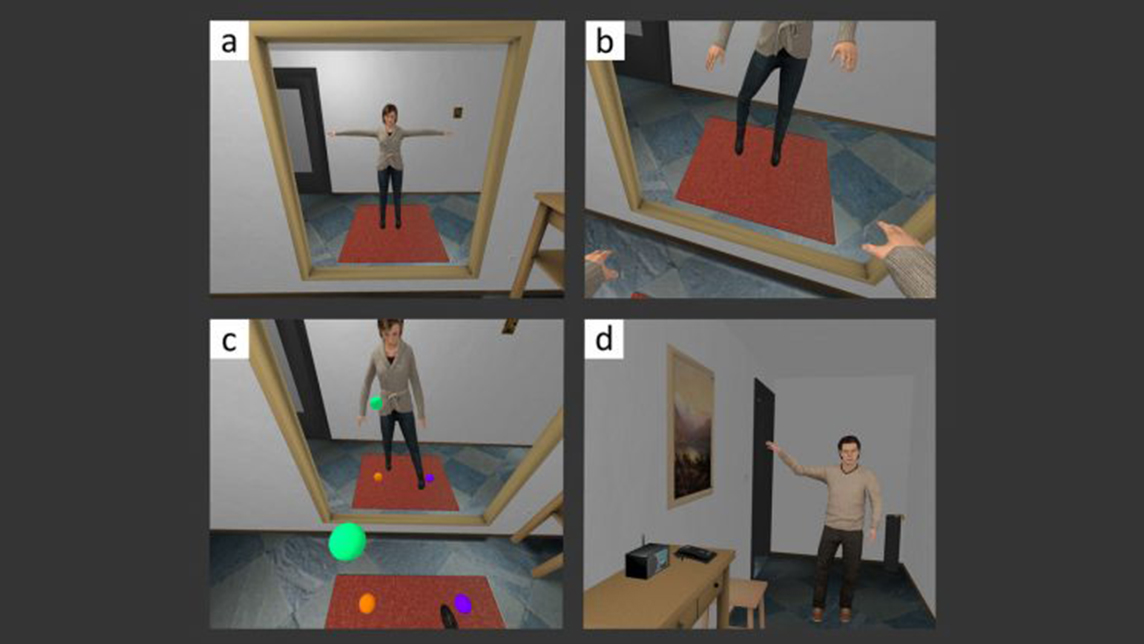Technology could be a low-cost method of easing pressure on local mental health services. VR is gradually becoming integral components of rehabilitation programs to treat people for various issues including phobias, traumas, depression and dementia. Virtual Bodyworks integrates computer science engineering, neuroscience and psychology to build innovative IVR content to achieve specific outcomes.
The startup was founded by University of Barcelona’s Mel Slater and Mavi Sánchez-Vives, who have worked on VR research projects since 2013. In 2015, the pair founded Virtual Bodyworks together with Bernhard Spanlang, an Austrian post-grad with a master’s in Computer Science and a VR engineering doctorate from UCL London.
Slater, the chief scientific officer of Virtual Bodyworks, was also a UCL professor in London. He is now an IVR fellow at Digital Catapult UK. He started a VR research group in 1991 at Queen Mary, University of London. He then joined UCL in 1996 where he founded the Virtual Environments and Computer Graphics group. Slater is based in Barcelona as a director of Experimental Virtual Environments for Neuroscience and Technology at the Department of Clinical Psychology and Psychobiology.
Sánchez-Vives is the chief Medical Officer of Virtual Bodyworks. She is also the head of Systems Neuroscience at top bioresearch center IDIBAPS. She is a prominent researcher of virtual embodiment at the University of Barcelona.
The first VR project started as a research study funded by the European Research Council (ERC). A second project, also funded by the ERC, was followed by a third study conducted with Oxford University in UK. The results were published and received positive peer reviews. As a result, the co-founders were able to raise almost €400,000 pre-seed funding to develop VR software for medical, social and psychological rehabilitation programs.
Commercial spinoff
Virtual Bodyworks was established as a commercial spin-off by the University of Barcelona, Event Lab, ICREA and IDIBAPS. Revenue is earned by producing bespoke VR content and products for private clients. The VR healthtech has also started exploring non-medical business opportunities with multinationals like Pepsico USA. The startup became profitable in 2017 and won an innovation award Premis Muncunill a la Innovació given by the City Council of Terrassa in April 2018.
In 2017, serial entrepreneur Albert G Zamora was appointed as the CEO to prepare for the commercial launch and marketing of the VR products. Zamora has many years of business experience in the healthcare industry.
The company also secured seed funding of €2 million in 2018 to launch of its first product VRespect.Me. The two-year trial of VRespect.Me on 200 prisoners produced very positive results that have now been peer reviewed in the world's leading science journal, Nature.
The project was a collaboration with the Catalan Department of Justice to rehabilitate men with a history of domestic violence. The product will be available in Spain and overseas. It is designed to help people to develop empathy and to learn new behavioral, non-aggressive strategies.
In 2019, a second product i-Cortex will be marketed to hospitals, clinics and even football clubs like FC Barcelona. The neurological software will help patients to fight chronic pain and speed up recovery from injuries. The name is the acronym for Immersive Cerebral and Orthopedic Rehabilitation and Training Exercises. The product was developed in local hospitals for the rehabilitation of patients who have suffered from a stroke, bone fractures or sports injuries.
A third product, ConVrself, is a psychological therapy that is in the advanced stages of product development with Pepsico. This unusual project focuses on self-therapy where volunteers assume the role of a therapist like a Sigmund Freud avatar who talks with them through their problems in virtual reality.
Affordable IVR
But Slater wants to expand the VR applications even further into both medical and commercial projects. In 2017, Virtual Bodyworks and partners have set up a research group in New York to explore innovative ways of using IVR to promote creativity and solve real world problems. CEO Zamora believes they can go a step further by providing treatment that cannot be conducted in the real world. In addition, companies like Samsung, Sony and Google have invested extensively to produce VR hardware like gaming headsets, IoT smart glasses and watches that are constantly in need of new content.
Virtual Bodyworks will continue to work with international partners to grow the business and to develop a wider range of VR applications. But large-scale global expansion requires mega-bucks from tech giants like Google or Facebook. For example, British AI startup DeepMind was sold to Google for over US$500 million in 2014. However, it’s not easy to break into the traditional healthcare market of well-established therapy programs. As in VR gaming and entertainment, VR will flourish more rapidly in the training of professionals such as medical students, firefighters and military personnel.
Market research is another growth sector with stakeholders eager to track shopping habits and influence consumer behavior. The social media conglomerate that already owns Instagram and WhatsApp, Facebook could easily kickstart its “Virtual Reality Might Be Coming to Your Baby Photos” plan by acquiring Virtual Bodyworks’ IVR software to enable users to share immersive experiences and photos.
Self-therapy products, such as VRespect.Me and ConVrself, could one day be prescribed by doctors for patients with behavioral or depression issues.











